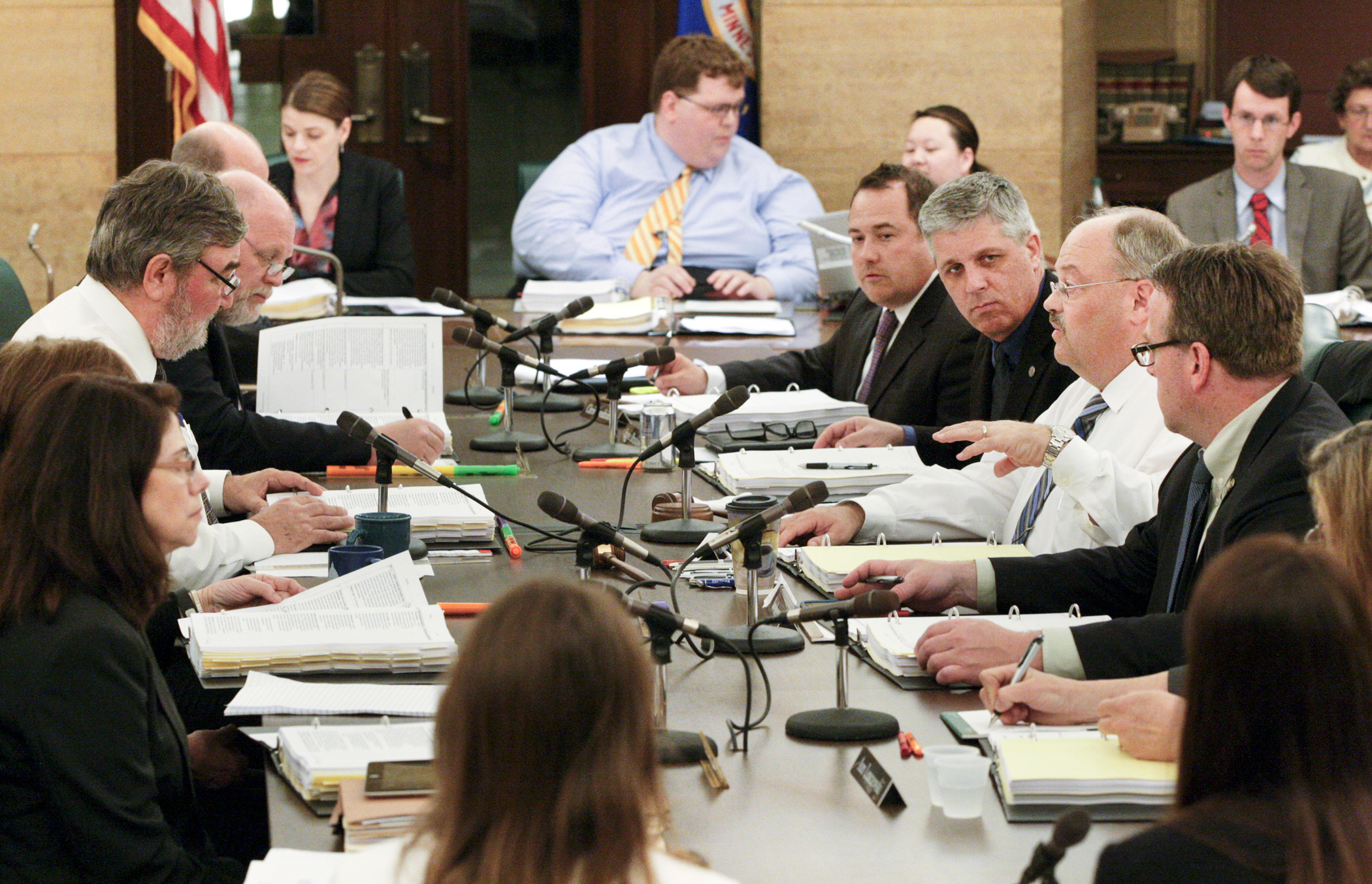A ’30,000-foot view’ shows wide differences in omnibus tax proposals

The House and Senate taxes committee chairs live at opposite ends of the state, and that spread was noted by Rep. Greg Davids (R-Preston) as he called to order the first conference committee meeting Wednesday on HF848*/SF828, the omnibus tax bill.
“I hope the tax bills are closer than we are geographically,” he said to Sen. Rod Skoe (DFL-Clearbrook), seated across from him at the conference table.
A look at the fiscal spreadsheet of the two bills, however, shows lots of dollar signs separating the proposals, not to mention those from the governor.
Over the 2016-17 biennium, the House would like to reduce tax revenues by $2.4 billion, largely through several tax credits. The Senate is looking for $1.6 million in tax revenue reductions; the governor $1.4 million.
Looking first for same or similar provisions, the five members of each body, took a “30,000-foot view,” of the two bills, which comprise over a hundred proposals heard in the House and Senate taxes committees this session.
Conferees plan to meet Thursday with Skoe holding the gavel. He said the agenda could include a review of some agricultural land provisions.
Income tax provisions seem to hold the most hope for agreement with some form of an education credit for qualifying K-12 expenses drawing the governor’s attention, as well as the Legislature. However, they differ in the credit amount, who should get it, whether it should include nonpublic school tuition, which programs should be covered and when it should take effect.
Extending the state’s research and development credit to sole proprietors also has a common interest, Again, though, the bodies differ on how it should be accomplished.
Revenue Commissioner Cynthia Bauerly, who represents the governor at the table, praised changes to the working family credit put forward by both bodies. The change would prevent residents of other states with earned income from claiming the state working family credit. Additionally, she noted inclusion of provisions that would allow an income tax credit for contributions to 529 college savings plans. However, the bodies differ on several parts of the provision including income eligibility requirements and effective dates.
The Senate appears to have little interest in many of the House property tax proposals. However, while not in agreement, both sides propose changes to the state general levy that is paid, over and above local property taxes, by the commercial and industrial tax base and seasonal recreational property owners.
Representing the House on the conference committee are Davids, Rep. Chris Swedzinski (R-Ghent), Rep. Steve Drazkowski (R-Mazeppa), Rep. Ann Lenczewski (DFL-Bloomington) and Rep. Bob Barrett (R-Lindstrom). Only Lenczewski and Davids have sat at the table in the past. They are up against more seasoned Senate conferees: Skoe, Sen. Kari Dziedzic (DFL-Mpls), Sen. Ann Rest (DFL-New Hope), Sen. Lyle Koenen (DFL-Clara City) and Sen. Paul Gazelka (R-Nisswa).
Related Articles
Search Session Daily
Advanced Search OptionsPriority Dailies
Ways and Means Committee OKs proposed $512 million supplemental budget on party-line vote
By Mike Cook Meeting more needs or fiscal irresponsibility is one way to sum up the differences among the two parties on a supplemental spending package a year after a $72 billion state budg...
Meeting more needs or fiscal irresponsibility is one way to sum up the differences among the two parties on a supplemental spending package a year after a $72 billion state budg...
Minnesota’s projected budget surplus balloons to $3.7 billion, but fiscal pressure still looms
By Rob Hubbard Just as Minnesota has experienced a warmer winter than usual, so has the state’s budget outlook warmed over the past few months.
On Thursday, Minnesota Management and Budget...
Just as Minnesota has experienced a warmer winter than usual, so has the state’s budget outlook warmed over the past few months.
On Thursday, Minnesota Management and Budget...